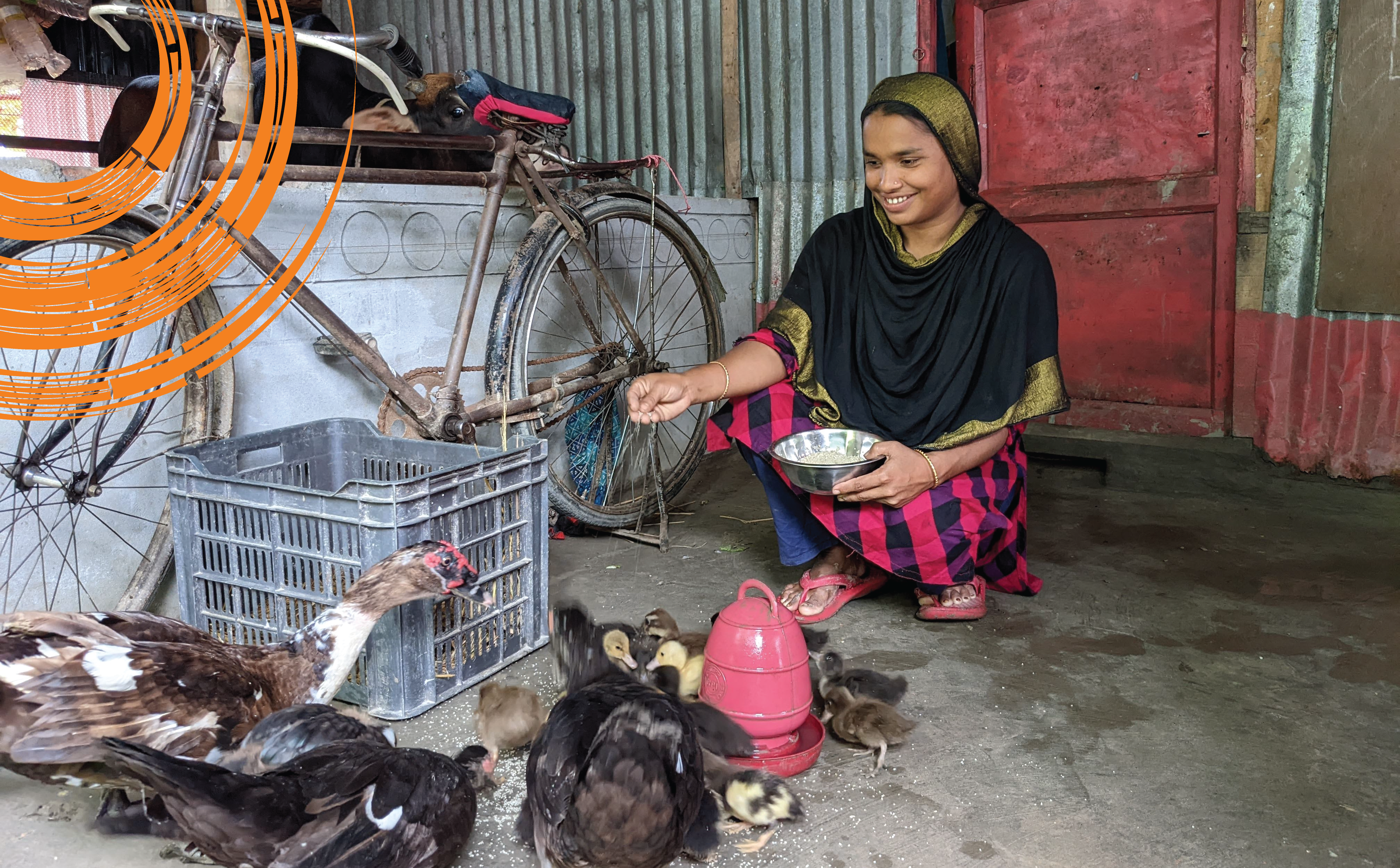
In the southern coastal districts of Khulna, Satkhira, and Bagerhat, women are rebuilding their lives with creativity and persistence. Salinity, cyclones, and floods have damaged homesteads, yet women continuously find ways to adapt. In a recent study of Innovision Consulting commissioned by UN Women titled “Gender Gaps in Climate Change Adaptation Initiatives in the Southwest Coastal Region of Bangladesh”, it was found that many rural women construct homes from bamboo and tin, elevate plinths with sandbags, and repair roofs after every monsoon, often without male labor or formal financial support.
Such everyday acts of adaptation are not minor. More than half of rural coastal households live in non-durable housing materials, yet these homes represent active resilience, each repair and elevation reflects women’s ingenuity and local engineering. These women design for survival: ensuring roofs slope to drain stormwater, raising livestock shelters, and keeping stored grain safe from saline intrusion.
When Cyclone Amphan struck in 2020, women-led households were among the first to rebuild. Many re-dug ponds for freshwater and replanted fast-growing fruit trees. Their quiet determination sustains communities even when formal aid is delayed.
Women as Innovative Leaders in Adaptation
Resilience in contemporary rural contexts extends well beyond the capacity for survival. Innovision’s study shows that rural women are key agents of innovation, actively shaping agricultural practices, technological adoption, and community governance structures that contribute to local economic transformation. Their engagement in participatory, community-based initiatives facilitates the development and implementation of context-specific adaptive strategies, highlighting their critical role in enhancing climate resilience and fostering sustainable development outcomes.
The Innovision study brought remarkable examples: in Satkhira, women’s groups manage communal seed banks; in Khulna and Satkhira, they have turned homestead gardens into profitable microenterprises by making hyacinth beds on floating water. These innovations not only improve household food security but also generate income that allows women to invest in stronger homes and education for their children as the household head. Women-led adaptation groups enhance local decision-making, facilitate early warnings, and promote environmentally sustainable livelihoods. Women are no longer mere participants in adaptation, they are leading it.
Designing the Future: Resilient Homes, Healthy Lives
Despite the challenges of informal and temporary housing, women’s local knowledge is reshaping how resilience is built. In the coastal belt, they now prioritize climate-smart housing: elevated plinths, reinforced walls, and better ventilation. Innovision’s report found that Climate Change Adaptation programs are now integrating women’s voices into rural climate resilience activities and have proven more sustainable and culturally appropriate.
Rural women are also leading in public health adaptation. Affected by extreme saline contamination, many organize collective rainwater collection systems and advocate for decentralized water infrastructure. Their leadership ensures that resilience planning meets everyday needs; privacy, health, and safety.
These efforts are creating ripple effects. When rural women have access to finance and technical knowledge, they extend innovation to the whole community; ensuring that adaptation is inclusive, locally owned, and enduring. Their contribution is, in essence, a national asset.
From Coping to Leading
Bangladesh’s rural women have long been described as vulnerable. Yet their story is one of hope, creativity, and leadership. They are transforming crisis into opportunity, and poverty into innovation.
Practical climate resilience for Bangladesh will not be built only on embankments or policies, but on the power of women, the backbone of rural resilience; the farmers who safeguard saline-tolerant seeds to feed their communities, the mothers who engineer safer homes against rising tides, and the leaders who mobilize strength, solidarity, and hope in times of crisis.
This International Day of Rural Women reminds us that resilience in Bangladesh is not built for rural women; it is built by them.
References
- Study on Gender Gaps in Climate Change Adaptation Initiatives in the Southwest Coastal Region of Bangladesh. (2025). Conducted by Innovision Consulting Private Limited and Commissioned by UN Women
- Haque, A. N., Dodman, D., & Hossain, M. M. (2019). Climate change impacts on housing and settlements in Bangladesh. Environment and Urbanization, 31(1), 17–32. https://doi.org/10.1177/0956247819828274
- Islam, M. T., & Hasan, M. M. (2021). Post-Amphan recovery and the gendered impacts of climate disasters in coastal Bangladesh. International Journal of Disaster Risk Reduction, 60, 102311. https://doi.org/10.1016/j.ijdrr.2021.102311
- Rahman, H., et al. (2024). Climate change adaptation strategy of the coastal indigenous community of Bangladesh. Advances in Civil Engineering, 2024, Article 5395870. https://doi.org/10.1155/2024/5395870
- UN Women & IUCN. (2022). State of Gender Equality and Climate Change in Bangladesh. UN Women Asia and the Pacific. https://asiapacific.unwomen.org/sites/default/files/2022-08/FINAL-Bangladesh-State-of-Gender-Equality-and-Climate-Change-Report_10-08-22.pdf
Author: Md. Rihan Hossain, an Associate in the Gender and Basic Services Portfolio at Innovision Consulting